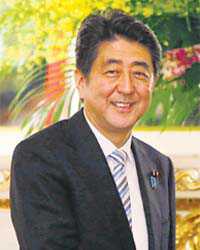India-Japan ties: Love in Tokyo endures
Much before India-Japan relationship was elevated to the strategic level, the film Love in Tokyo, produced in 1966, captured the romantic flavor of the Japanese locales on Indian celluloid and touched the sentimental chord of India’s cine-goers. Today, it is truly a love story sustained and nurtured by convergence of political, economic, strategic and security interests of the two countries. It is a time-tested relationship based on mutual trust, sensitivity and concern. There is no contentious issue, no major irritants, rather a bounty of shared interests, values and reciprocal goodwill. In spite of the regime change in both the countries, the relationship between India and Japan has been growing in strength. The importance Prime Minister Narendra Modi attaches to Japan can be discerned from the fact that his first destination for a bilateral visit outside India’s immediate neighbourhood was to Japan early September last year, ahead of his visit to the USA later.
To further the relationship between the two countries, the Japanese Prime Minister Shinzo Abe is visiting India this week to participate in the Annual summit-level meeting between the two Prime Ministers. Besides Russia, Japan is only the second country with which India has the institutional mechanism of Annual summit-level meeting. Abe is no stranger to India. His grandfather Nobusuke Kishi as the Prime Minister of Japan had visited India in 1957. As a child, Abe might have heard from his grandfather the story of India, which endures in his memory even today. Abe has also the unique distinction of having addressed the Indian Parliament in 2007. He was also the chief guest at India’s Republic Day parade in 2014.
Though a distant neighbour, Japan’s presence in the Indian economy is palpable. In the automobile sector, and also in the white goods sector, Japanese brands are household names. The Delhi Metro, the lifeline of the capital choked with pollution, is yet another icon of Japan’s goodwill gesture. After the success of the Metro, it is likely that India will soon have its first bullet train between Ahmedabad and Mumbai with Japan’s support. The two countries will issue a joint statement on the very first day of Abe’s three-day visit, commencing today.
The India-Japan strategic partnership jells neatly in the context of the transformation taking place in the domestic economies of the two countries. At a time when India has emerged as the fastest- growing world economy, Japan has the potential to become India’s most preferred partner in its trajectory of growth. Japan is resetting its economy after it plummeted to third position, yielding to China in 2010, which occupied the position of world’s second-largest economy. The calibrated approach to revamp the Japanese economy has been dubbed as “Abenomics,” with monetary easing, an expansionary fiscal policy and long-term growth. There are signs of green shoots in the Japanese economy.
The recent trend indicates that the Japanese economy grew at an annual 1.0 poer cent pace instead of shrinking. India’s projected $Itrillion infrastructural requirement offers a good opportunity for Japanese investments in roads, highways, smart cities. Japan has already committed to the flagship projects like the Western Dedicated Freight Corridor, Delhi-Mumbai Industrial Corridor and the Chennai-Bengaluru Industrial Corridor. Once the Land Acquisition Bill is passed by Parliament, these projects will take off, create jobs and boost the economy of the country. Besides, the economic aspects of the engagement between the two countries, security and defence cooperation have acquired salience in recent years particularly in the backdrop of China’s rising profile in the maritime domain.
There is a regular Defence Ministers’ dialogue and a dialogue mechanism between the National Security Advisers of the two countries after the creation of the National Security Council in Japan last year. Japan has been participating in the India-US Malabar exercises and there have been joint exercises between Indian Navy and the Japanese Coastguard. The lifting of the ban on export of defence equipment and technology by Japan has opened up avenues of cooperation in joint production and transfer of defence technology. Currently there is a joint working group on cooperation in the US-2 amphibious aircraft. The two countries are also trying hard to clinch an agreement in nuclear cooperation for civilian purposes. Since the issue is highly sensitive in Japans domestic politics, the finalisation of the deal is taking a longer time. But it is only a question of time. This can be gauged from the fact that Japan has decided to remove six of India’s space and defence-related entities from is end user list. The two countries are working together for India’s membership in four international export control regimes, viz, Nuclear Supplier’s Group, Missile Technology Control Regime, Wassenaar Arrangement and Australia Group, with the aim of strengthening the international no-proliferation efforts. In India’s external relations, perhaps it won’t be an exaggeration to say that “East or West, Japan is the best”.
No wonder that New Delhi looks towards Japan as India’s “indispensible natural partner”. It is USA which has been described by New Delhi as “India’s natural partner”. The prefix “indispensable” puts India’s relationship a notch above the US. Prime Minister Narendra Mod in his recent lecture at Singapore said, “There are few partnerships that enjoy so much goodwill in India as our relationship with Japan”.
The writer is a Director in the Research and Information Division of the Lok Sabha Secretariat. The views expressed are personal.
Unlock Exclusive Insights with The Tribune Premium
Take your experience further with Premium access.
Thought-provoking Opinions, Expert Analysis, In-depth Insights and other Member Only Benefits
Already a Member? Sign In Now










